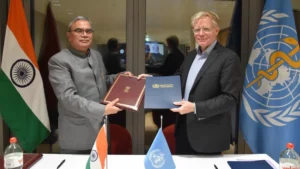GS2 – Social Sector

Context:
India collaborates with the World Health Organization (WHO) to promote AYUSH globally through a significant agreement on traditional medicine practices.
This agreement initiates the development of a dedicated Traditional Medicine section within the International Classification of Health Interventions (ICHI). The inclusion of this module will allow AYUSH to be recognized using globally accepted terminology.
AYUSH stands for Ayurveda, Yoga & Naturopathy, Unani, Siddha, and Homeopathy – systems of traditional and alternative medicine managed by the Ministry of Ayush in India.
Together, the ICD-11 (for disease classification) and the new ICHI module (for intervention classification) will help establish AYUSH as a credible, evidence-based, and policy-supported part of international healthcare frameworks.
International Classification of Health Interventions (ICHI):
ICHI is a uniform coding framework developed by WHO to record health interventions uniformly across countries and healthcare environments.
Functioning alongside the WHO’s International Classification of Diseases (ICD-11), ICHI categorizes and codes the procedures and therapies administered to patients.
Understanding Traditional Medicine:
- Traditional medicine comprises the knowledge, methods, and practices developed over time within various cultures to maintain health and treat physical and mental ailments.
- Out of WHO’s 194 Member States, 170 have reported usage of traditional practices such as herbal remedies, acupuncture, yoga, and indigenous therapies.
- Many nations value traditional medicine as a key healthcare resource and are actively integrating its products, practices, and professionals into their public health systems.
- For large populations, particularly in remote or underserved regions, traditional medicine remains the primary form of healthcare due to its accessibility, affordability, and cultural relevance.
- The 2018 Astana Declaration on Primary Health Care highlights the importance of incorporating traditional knowledge and technologies to achieve universal health coverage.




